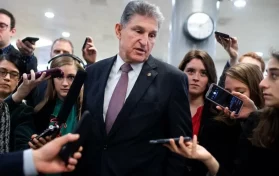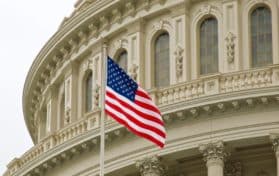
While Senator Joe Manchin (D-WV) continues to claim that the Inflation Reduction Act will not increase taxes on people making less than $400,000 annually, a new analysis by the Tax Foundation shows that not only will the legislation raise taxes, but it could also kill as many as 30,000 jobs. The Wall Street Journal published an opinion piece that discussed at length how these tax hikes would target the middle class.
Senator Manchin made the rounds of at least five Sunday news talk shows to tout the benefits of the bill, and he made an appearance on the Faulkner Focus on Fox Tuesday. Host Harris Faulkner asked Senator Manchin point-blank if the bill would raise taxes on people making $30,000 or less per year. Manchin gave an emphatic “no” as an answer.
Yet, nonpartisan organizations such as the Tax Foundation say that not only will the bill raise taxes on many low-income and middle-class Americans, but it could also cut as many as 30,000 full-time jobs across the American economy.
The Tax Foundation analysis read: “By reducing long-run economic growth, this bill may actually worsen inflation by constraining the productive capacity of the economy.”
The Inflation Reduction Act is expected to raise up to $739 billion in revenue over a ten-year period; the New York Times says the bill will cost $485 billion. The bill is written so that it will increase the IRS‘ funding to hire more employees, close a popular tax loophole regarding investing, create a fifteen percent minimum “corporate tax” on businesses’ “book income,” and allowing Medicare to negotiate the price of prescription drugs.
Any revenue this new bill would garner is intended to go toward climate change initiatives and lower healthcare costs, at least where prescription drugs are concerned. Proponents of the bill say that it would also help to pay down the nation’s debt.
On July 27, after it was announced that Senator Manchin had come to an agreement with Senate Majority Leader Chuck Schumer (D-NY) on a spending bill, President Biden addressed the nation. He announced the name of the bill, and he claimed, “This is the action the American people have been waiting for. This addresses the problems of today – high health care costs and overall inflation – as well as investment sin our energy security for the future.”
On Tuesday, multiple news outlets released information regarding the “deal” that had been made between Manchin and Schumer was related to a pipeline that runs through parts of Manchin’s West Virginia. The Mountain Valley pipeline began construction, but a federal permit issue has prevented the completion of the project. Manchin and Schumer worked out a deal regarding permitting regulations; this is slated to be a different piece of legislation brought before the Senate at another time.
Manchin has been forthright in telling Americans that he requested some legislation that regarded the way permitting is carried out.
According to the Tax Foundation, their analysis shows that the Inflation Reduction Act as a spending bill would generate approximately $656 billion over a ten year period before the expanded tax credits (for renewable energy)kick in; When the Foundation factored those credits in to the analysis, the legislation would only add approximately $304 billion to the nation’s revenue.
In regards to the American economy, the Inflation Reduction Act is shown to only provide about 0.05 percent of an increase in each household’s annual income. The legislation would also trim wages by 0.1 percent.
Tax analysts at the Tax Foundation say that it is the fifteen percent corporate tax that will do the most devastation to the economy. The tax would reduce an already-shrinking GDP by 0.3 percent. This would contribute to the wage loss and may cost 23,000 full-time jobs at large corporations. (The other 7,000 jobs would be across various industries.)
The legislation is not a “done deal” even though Manchin claims he will support the bill. Senator Kyrsten Sinema (D-AZ) has released a statement from her staff that she is still reading the bill, and she is still debating on whether she will support or vote against the legislation.





